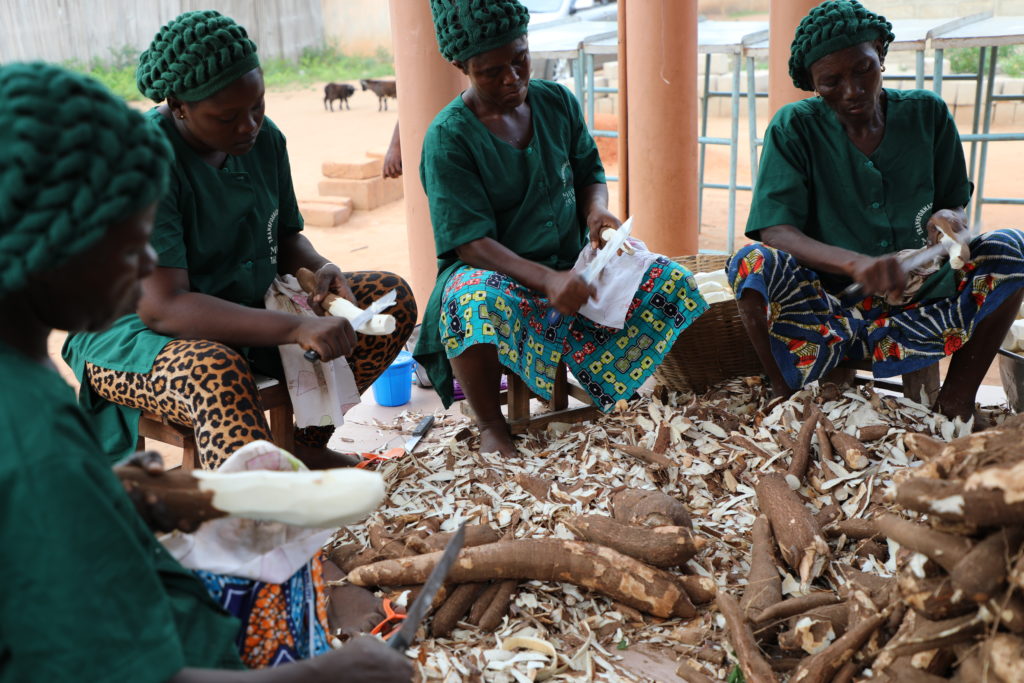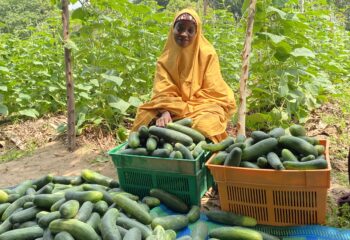
IFDC Press Release
For Immediate Release
Contact: Olga Kokode ([00229] 97 18 98 31/95 96 46 42; okokode@ifdc.org)
Friday, March 22, 2019 – The Communal Approach to the Agricultural Market in Benin – Phase 2 (ACMA2) held its second Monitoring Committee meeting during March 20-21, 2019. Comprising key local and national partners, the ACMA2 Monitoring Committee advises and supports the supervision of the ACMA2 program to ensure that the approach and interventions are in line with national, communal, and market realities and that ACMA2 acts as a transparent and effective facilitator in communal development and agricultural and agri-food markets.
During the meeting, ACMA2 presented the project’s 2018 results and its 2019 work plan to committee members. Led by Constant Dangbegnon, ACMA2 chief of party, and his team, committee members visited program intervention sites in Ouinhi and Dasso.
In Ouinhi, the Monitoring Committee visited a maize storage facility composed of a 500-ton storage warehouse, a sales shed, a drying area, an office, and equipment, including a scale for weighing bags, a gin, tarpaulins, and two motor tricycles. The total cost of the facility was 133,628,668 FCFA (U.S. $230,415), with a 5% contribution from the mayor of Ouinhi. A total of 72 actors, including 42 women and 34 youth, took part in a pilot warrantage[1] scheme at the facility. Participants are members of four cooperatives that joined together to form the Communal Maize Producers’ Union (UCPM), which is responsible for the management of the warrantage.
Initially, 74 tons of maize are being stored. “It is just a test for us – we can do more than that,” said a woman producer in Ouinhi. “Next season, we will fill this store with 500 tons!”
In Dasso, the committee members visited a unit that processes cassava into gari. The processing unit includes a hut for cassava peeling, a washing basin, well-equipped drilling, three improved stoves for roasting gari and tapioca, and a bench for selling products. This infrastructure cost 28,000,000 FCFA (U.S. $48,280) and is managed by the Medjro group, whose members are women that produce gari and natural and improved tapioca. The storage unit has become a major center for mobilizing supply, and other networked groups visit the facility to receive training from the Medjro group.
After the field visit, the committee members made recommendations for further ACMA2 activities and results. These include:
- Systematically implement the recommendations.
- At the store level, differentiate between warrantage and storage.
- Give special attention to youth entrepreneurship.
- Develop and implement an IEM management manual involving agribusiness cluster stakeholders.
- Continue to promote synergy among institutions working in the regions to avoid duplication and share knowledge on infrastructure management.
###
The Communal Approach to the Agricultural Market in Benin – Phase 2 (ACMA2) is a project funded by the Embassy of the Kingdom of the Netherlands in Benin. It aims to improve the food and nutritional security of rural populations in 28 municipalities in the departments of Ouémé, Plateau du Zou and Hills. The program’s approach is to consolidate the achievements of Phase I (2013-2017) and facilitate access to local and international markets (particularly Nigerian) for the economic actors (producers, processors, traders, etc.) of agribusiness clusters. This is accomplished through targeted interventions in product value chains (access to inputs and innovations, access to financing, and marketing and professionalization) and multi-stakeholder dynamics, considering the resources and potential within the communes. The program is implemented by a consortium led by the International Fertilizer Development Center (IFDC) and composed of IFDC, CARE International Benin / Togo and the Royal Netherlands Institute for the Tropics (KIT). Two committees ensure the steering of the program: (i) the Steering Committee, which is restricted to members of the consortium and to the Dutch Embassy near Benin; and (ii) the Monitoring Committee, which includes key local and national partners.
The International Fertilizer Development Center (IFDC) began in 1974 with the mission to improve soil fertility and crop nutrition in tropical regions. Since then, IFDC has grown to encompass an array of agricultural solutions – from market development to policy advocacy, fertilizer technology development to project implementation in the field, and farmer mechanization to micronutrient research. For more information, visit www.ifdc.org.
[1] Warrantage is a system of rural credit that allows a producer organization and/or its members to obtain a loan by making a guarantee for their products that can increase in value. The purpose of this credit system is to avoid producers having to sell right after harvest when prices are at their lowest and to give them the opportunity to access credit. While the products are deposited in storage, the microfinance institution grants credit by paying 80% of the value of the product. In the lean season a few months later, the same product is sold at an attractive price, and the rebates are paid to the producers after repaying their credits.
COMMUNIQUE DE PRESSE DU COMITE DE SUIVI ACMA2
Pour diffusion
22 mars 2019
Les 20 et 21 Mars 2019 s’est tenue la deuxième session du Comité de suivi du Programme Approche Communale pour le Marché Agricole au Bénin – phase 2 (ACMA2). Trois temps forts ont marqué cette session : Présentation, visite de terrain et recommandations. Dans un premier temps les membres du comité de suivi ont eu droit à une présentation des résultats 2018 du Programme ACMA2 et de son Plan de Travail 2019. Ensuite, pour la visite de quelques sites d’intervention du programme, La délégation des membres du Comité de suivi, a été conduite par Constant DANGBEGNON, le chef du programme ACMA2 et son équipe sur le terrain successivement à Ouinhi et à Dasso.
A Ouinhi, le Comité de suivi a visité l’Infrastructure de stockage de maïs constitué d’un magasin de stockage de 500 tonnes, un hangar de vente, une aire de séchage, un bureau pour le gestionnaire et des équipements tels qu’une balance pour la pesée des sacs, une égreneuse, des bâches, ainsi que deux moto tricycles. Le coût global de ce joyau est 133 628 668 FCFA avec une participation de 5% de la mairie de Ouinhi. Le comité a pu constater que les acteurs ont démarré une expérience pilote de warrantage avec une quantité de maïs stocké de 74 tonnes. « C’est juste un test pour nous, on peut faire plus que ça, à la saison prochaine nous allons remplir ce magasin avec 500tonnes de maïs » a déclaré, confiante, Parfaite une des vaillantes femmes productrices de Ouinhi, précisant que 72 acteurs dont 42 femmes et 34 jeunes ont participé à ce mécanisme pilote de warrantage. Les participants au mécanisme de warrantage proviennent de quatre coopératives qui se sont mises ensemble et c’est l’Union Communale des Producteurs de Maïs (UCPM) qui porte la gestion du warrantage. D’ici juin, l’opération du warrantage sera dénouée, ce qui fera suite à un bilan et la distribution des ristournes aux adhérents.
A Dasso, l’infrastructure visitée est une unité de transformation du manioc en gari. Les spécificités de ce centre de transformation sont : une paillote pour l’épluchage du manioc, un bassin de lavage, un forage équipé, de trois foyers améliorés pour la torréfaction du gari et du tapioca, une paillasse pour la vente. Cette infrastructure d’un coût de 28 000 000 FCFA est gérée par un groupement de femmes productrices de gari et de tapioca naturel et amélioré. Grâce à cette unité, le groupement Médjro est devenu un centre de référence, où des formations sont données à d’autres groupements constitués en réseau. Ce centre de stockage est devenu un grand centre de mobilisation de l’offre.
Au lendemain de la visite de terrain, les discussions au sein du comité de suivi ont abouti à des recommandations à l’endroit du Programme ACMA2 pour la suite de ses activités et l’atteinte des résultats. Entre autres recommandations on a :
- Systématiser le rappel des recommandations et le rappel de leur mise en œuvre
- Au niveau des magasin de stockage érigés, faire la différence entre le warrantage et le stockage
- Accorder une attention particulière à l’entreprenariat des jeunes
- Elaboration et la mise en œuvre d’un manuel de gestion des IEMs en impliquant des acteurs des PEA
- Continuer à promouvoir la synergie entre institutions intervenant dans les régions pour éviter les doublons, et partager les connaissances en matière de gestion des infrastructures
A propos de ACMA2 :
Programme « Approche Communale pour le Marché Agricole au Bénin – phase 2 » ACMA2 un projet financé par l’Ambassade du Royaume des Pays Bas au Bénin. Il vise l’amélioration de la sécurité alimentaire et nutritionnelle des populations rurales dans 28 communes des départements de l’Ouémé, du Plateau du Zou et des Collines. L’approche du programme consiste à consolider les acquis de la phase I (2013-2017) et faciliter l’accès aux marchés locaux et internationaux (notamment nigérian) pour les acteurs économiques (producteurs, transformateurs, commerçants, etc.) des Pôles d’Entreprise Agricole (PEA). Ceci à travers des actions ciblées sur les chaînes de valeurs des produits (accès aux intrants et innovations, accès au financement, et commercialisation et professionnalisation) et des dynamiques multi-acteurs prenant en compte des ressources et potentialités disponibles au sein des Communes. Le programme est mis en œuvre par un consortium dirigé par le Centre International pour le Développement des Engrais (IFDC). Ce consortium est composé de IFDC, de CARE International Bénin/Togo et de l’Institut Royal des Tropiques (KIT) des Pays Bas. Pour assurer le pilotage du programme, il existe deux comités : (i) le comité de pilotage qui est restreint aux membres du consortium (IFDC, CARE Bénin/Togo, et KIT) et à l’Ambassade des Pays-Bas près du Bénin ; et (ii) le comité de suivi qui est élargi aux principaux partenaires locaux et nationaux.
Le comité de suivi du Programme ACMA2 a pour rôle de conseiller, appuyer le comité de pilotage dans la supervision du programme ACMA2, de s’assurer que l’approche et les interventions sont en phase avec les réalités nationales, communales et opportunités des marchés, et que le programme agit comme un facilitateur transparent et efficace dans le développement communal et des marchés agricoles et agro-alimentaires.




